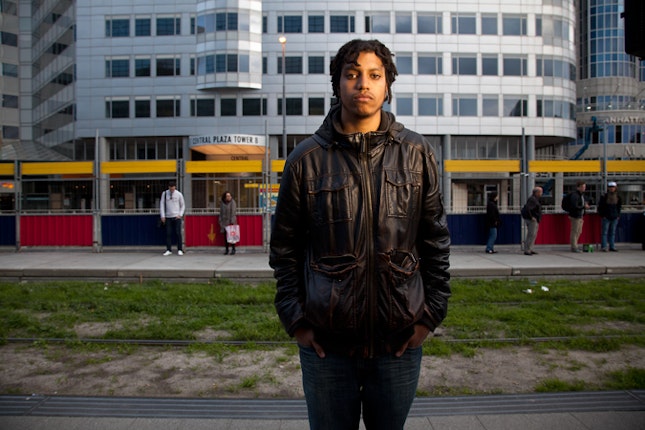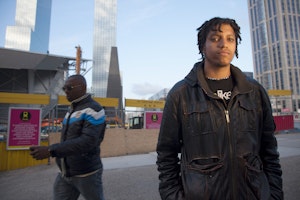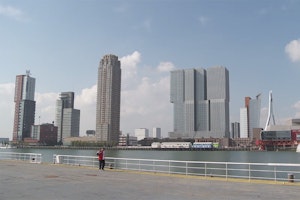Equality Under Pressure: A Portrait Series
-

Michael, a computer science student in Rotterdam: “What does it feel like to be stopped? It feels like you’ve done something really bad even though you haven’t. It also feels like you’ve done something, just you know, that it’s your fault, and that you’re being stopped for that. You don’t expect that one day, out of nowhere, the police come to you and say that you have to kneel down, put your hands on your head, and that you’re a suspect in a robbery. I mean, it really freaks you out because you—especially me—I mean I have never done anything criminal. So yeah, it was a real shock for me.” © Ed Kashi/VII for the Open Society Foundations -

Ismail, accounting student in Rotterdam: “If Moroccans are picked on by the police, then they are going to retaliate, because respect is a two-way street. But if you treat me really differently, then I think, ‘Who do you think you are to treat me like that?‘ You might be the police, but you should treat me with respect, then I will also show you respect. And if they don’t do that, then the Moroccan kids won’t do that either. Then they will start throwing things at them, curse them out and break car windows, set cars on fire. These are all the things that can happen if they go on this way.” © Ed Kashi/VII for the Open Society Foundations -

Anass B, technology student in Gouda: "I was jogging on the bike path, it was around 8.30 and a police van stopped in front of me and asked me for my ID card, and when I ask 'Why?', then they always come with the most unbelievable excuses. 'You’re at an unusual place at an unusual time.' … It’s not good that they pick me out just because I’m Moroccan. In a lot of situations, this can create aggression or even depression. You suddenly start to realize that you are not welcome here at all." © Ed Kashi/VII for the Open Society Foundations -
![Anass J, a sports student in Rotterdam: "It scares me because then I think, 'What are they looking for? Do I look like a criminal?' There were people standing around, and they saw how they started to search us in this busy street near the Delfshaven [Rotterdam]. It’s always crowded there. I am ashamed when this happens. I get embarrassed and then I think, 'These people are looking at me like I’ve done something, as if I’ve committed a crime.' It happens so often, I think, 'What is it this time? What have I done this time?' Do they know that I’m embarrassed by it? That those other people are also looking at me and then it makes me feel uncomfortable." Photo credit: © Ed Kashi/VII for the Open Society Foundations](https://opensocietyfoundations.imgix.net/uploads/537aa930-97ee-4643-bd81-c1856a1732f8/20120401-ekashi-ethnic-profiling-netherlands-675-004.jpg?auto=compress%2Cformat&fit=min&fm=jpg&h=430&q=80&rect=0%2C0%2C675%2C450)
Anass J, a sports student in Rotterdam: "It scares me because then I think, 'What are they looking for? Do I look like a criminal?' There were people standing around, and they saw how they started to search us in this busy street near the Delfshaven [Rotterdam]. It’s always crowded there. I am ashamed when this happens. I get embarrassed and then I think, 'These people are looking at me like I’ve done something, as if I’ve committed a crime.' It happens so often, I think, 'What is it this time? What have I done this time?' Do they know that I’m embarrassed by it? That those other people are also looking at me and then it makes me feel uncomfortable." © Ed Kashi/VII for the Open Society Foundations -

Moussa, sports student in Gouda: "I was stopped once for no reason, and then they searched me, even though I didn’t give them permission to. Just like that, and it had this really weird effect on me, like 'Can they really do that?' I don’t think it’s right, to be honest. I mean, they just shouldn’t be able to do that for no reason. A couple months ago, I was also stopped, and I was yelled at and insulted. They told me to just keep walking, fast, and ... yeah, what are you doing here and why are you stopping here? So I said that I was allowed to walk there if I wanted, and then they just started yelling at me. They also pushed me away. Just really pushed me, like 'go away.' And I don’t know why." © Ed Kashi/VII for the Open Society Foundations -

Adil, social work student in Gouda: "During the checks, what do I think about? When it happens, there are always people walking around. People start staring at you. 'What is Adil doing with the police?', 'What are those guys doing with the police?' or 'What do the police want with them?', 'What have they done this time?' How do the police see me? They just see me as a Moroccan, like all the other Moroccans, and that just makes you feel really bad. It’s like you have to scream for your rights even though they are doing you wrong. That feeling is really frustrating. It destroys something inside of you." © Ed Kashi/VII for the Open Society Foundations -

Prasand, Technical administrator in Amsterdam: “The fact that I felt I was treated this way purely because of the colour of my skin, that you receive such treatment…yes, that was pretty intense. I also don’t want to be confronted with such a backwards way of thinking; such an inhumane way of treating people. I think is really important for the police to realize that these are not one-time incidents. When you are a person of color, if I can just say it really crudely, you have these kinds of experiences a lot.” © Ed Kashi/VII for the Open Society Foundations -

Arjan Kasius, police inspector in Gouda: "My police colleagues need to be aware that the minute they ask someone for their ID, or just take a quick look in someone’s car, that yes, they’re just doing their job, but that it has a really huge impact on the person being subjected to the check. Particularly when it involves young people who aren’t actually involved in crime at all. … It is really important that you maintain a connection with the residents in your work area, including the young people, and including residents from foreign countries. It is important that as a police organization, you look for trust, initiate contact with the residents also for your own legitimacy, because when things do happen, then ultimately, there is only one police force, and this is not the police force that only represses the young people, but one that can also provide assistance to the young people the minute they get in trouble." © Ed Kashi/VII for the Open Society Foundations -

Sidney Mutueel, police chief inspector in Rotterdam: "Once I take off my uniform I become a citizen...and get stopped by my colleagues. I’ve been approached in a really impertinent, unfriendly way, and that has an effect on me. And what went through my head at that moment was that whether I’m a policeman or not, I’m still a person. You’re supposed to treat other people as humans. It doesn’t take much effort to take me seriously and to check that registration because after all, it’s there, in black and white. But even then, you don’t believe me. And then I thought, 'Why do I have to prove myself again?' It really affects you. You’re not taken seriously." © Ed Kashi/VII for the Open Society Foundations
The Dutch pride themselves on being members of an open, tolerant, and fair society. But for a growing number of people in the Netherlands, this ideal is being put under pressure by proactive police actions.
A new report documents how ethnic minorities in the Netherlands, mainly of Moroccan, Surinamese, and Antillean backgrounds, are more frequently stopped and searched by police than white people, purely because of the way they look. This is ethnic profiling.
But what does it mean to be targeted by police? And what impact does it have?
We asked those who would know. In this portrait series, which features photographs by Ed Kashi, seven young men and two police officers talked to us about their experiences. Their testimony reveals ethnic profiling’s hidden toll.


![Hicham Kochman (aka Axiom), artist, composer, and author in Lille: “Those who do not live with this, this harassment, don’t understand what we are talking about. They don’t know what it generates in oneself, on the level of one’s feelings, to be designated, to be second tier, third tier, told you are nothing and to shut up. In this way they make you believe that you are nothing and no one. It’s a daily, ongoing form of humiliation. They [the police] are armed, so this danger exists daily and you are insulted daily.” Photo credit: © Ed Kashi/VII for the Open Society Foundations A young man leaning against a wall](https://opensocietyfoundations.imgix.net/uploads/3d3138de-8e50-4d03-879c-6b0fc3040e6f/20120401-ekashi-ethnic-profiling-france-001.jpg?auto=compress%2Cformat&fit=min&fm=jpg&h=200&q=80&rect=0%2C14%2C673%2C422)